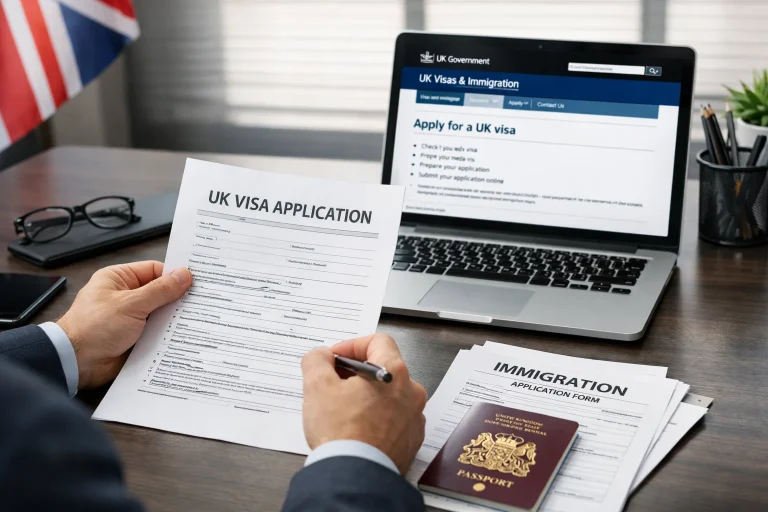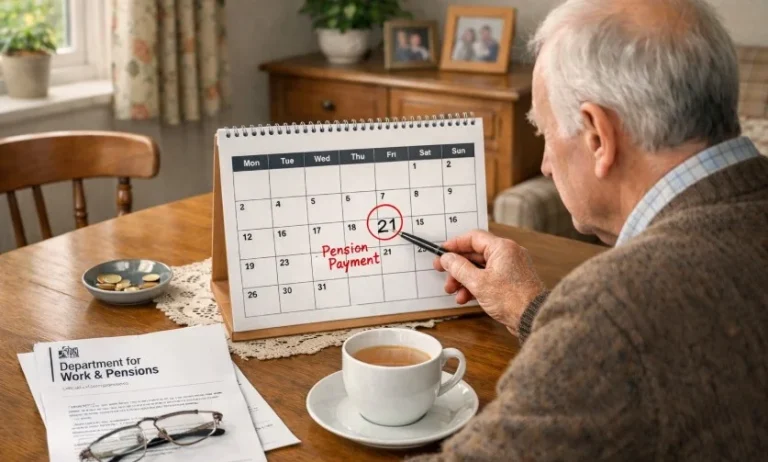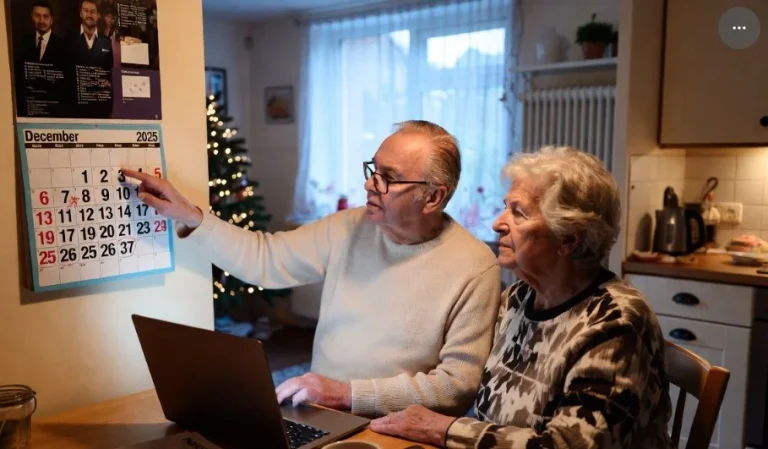In recent weeks, social media has been flooded with claims that the Department for Work and Pensions (DWP) will issue an £800 Christmas bonus to benefit recipients.
While the news sparked hope for many during a financially challenging season, it quickly raised concerns about its authenticity.
This article explores the origins of this misinformation, clarifies the actual DWP Christmas bonus, and outlines the real support available to those relying on state benefits during the festive period.
What Is The Real DWP Christmas Bonus In The UK?

The Department for Work and Pensions (DWP) has offered a Christmas bonus to eligible claimants for decades.
Despite circulating rumours online, the amount has consistently remained at £10 since its introduction in 1972. This bonus is a tax-free, one-off payment given in early December.
The bonus is added automatically to the accounts of individuals receiving specific qualifying benefits. It does not require any form of application, nor is it issued as a separate claimable benefit.
The real purpose of the Christmas bonus is to offer a small token of seasonal support for people relying on state benefits. Although modest, it is an official government scheme that helps highlight those currently in receipt of long-term support.
Where Did The £800 Christmas Bonus Rumour Come From?
The viral rumour about a £800 Christmas bonus originated from misleading social media posts that gained significant traction in late 2024.
Some content included edited screenshots, fabricated news articles, and fictional quotes claiming the DWP would award £800 to every benefit recipient.
Misinformation like this spreads rapidly due to its emotional appeal, particularly during the festive season when financial pressures are at their peak.
Many users shared the posts without verifying their authenticity, which contributed to a wider belief that the claim might be true.
Social media platforms became a hotspot for this misinformation. A number of groups and pages encouraged users to “spread the word,” further increasing the visibility of the claim. News outlets and fact-checking services were quick to respond, confirming the story was entirely false and unsupported by any government documentation or announcements.
Who Is Actually Eligible For The DWP Christmas Bonus?

Eligibility for the DWP Christmas bonus is limited to individuals receiving specific qualifying benefits during the qualifying week, typically the first full week of December. These benefits include:
- State Pension
- Pension Credit
- Attendance Allowance
- Carer’s Allowance
- Disability Living Allowance (DLA)
- Personal Independence Payment (PIP)
- Incapacity Benefit (long-term)
- Severe Disablement Allowance
- Contribution-Based Jobseeker’s Allowance (only in limited cases)
- Contribution-Based Employment and Support Allowance (ESA)
- Widow’s Pension or War Widow’s Pension
Universal Credit on its own does not make someone eligible for the Christmas bonus. However, if a person receives Universal Credit alongside another qualifying benefit, they may still qualify for the £10 payment.
Eligibility is assessed automatically by the DWP. If a person meets the conditions and is receiving at least one qualifying benefit during the qualifying week, the bonus will be issued without the need for a claim.
Why Is The DWP Christmas Bonus Amount Not £800?
The Christmas bonus was introduced as a modest gesture in the early 1970s and has remained fixed at £10 ever since.
Despite increasing living costs, the amount has never been adjusted. There are multiple reasons the amount has not been revised:
- Budget constraints within welfare expenditure
- Lack of government policy updates addressing the bonus value
- The bonus is symbolic and not intended as a primary source of holiday support
There is no historic or legislative connection to the figure of £800. This number has no precedent in any DWP documentation or official benefit scheme.
Some claimants may confuse the Christmas bonus with other forms of winter support, such as Cost of Living Payments or Winter Fuel Payments.
These separate support schemes often offer higher payments, which may contribute to the confusion.
Here is a breakdown of common winter payments for 2024:
| Support Type | Payment Amount | Eligibility Criteria |
| Christmas Bonus | £10 | Specific qualifying benefits during qualifying week |
| Winter Fuel Payment | £250 to £600 | Born before 25 September 1957 |
| Cold Weather Payment | £25 per qualifying week | Temperature-specific, for eligible benefit claimants |
| Cost of Living Payment | £299 (final instalment) | Universal Credit, Pension Credit, ESA, and other qualifiers |
These payments are separate from each other and managed under different schemes. None of them, including the Christmas bonus, currently offer £800 as a single payout.
How To Identify Fake News About DWP Payments?
With the rise in social media-driven content, it’s important for the public to become more discerning when encountering news related to financial support or benefits.
Misinformation can appear highly convincing but often lacks verifiable sources.
Key indicators of fake benefit news include:
- No official links to gov.uk or the DWP
- Claims that seem too good to be true, like sudden large payments
- Poor spelling, formatting, or anonymous “quotes”
- Posts urging quick sharing or viral spread
Fact-checking organisations, mainstream media outlets, and official DWP communications have become critical in combatting false narratives. Individuals should rely only on trusted channels such as:
- The official gov.uk website
- Verified social media accounts from government departments
- News reports from established outlets
Verifying information before acting on it helps prevent fraud, scams, and confusion, especially among vulnerable groups who depend on benefit payments.
When Are Legitimate DWP Christmas Payments Made?
The DWP typically processes Christmas bonus payments during the first full week of December. This schedule has remained consistent over the years, ensuring that recipients receive their bonus in advance of the Christmas holiday.
Payment dates may vary slightly depending on the benefit schedule of each individual, but all eligible recipients should receive the bonus during the designated week.
The payment appears separately on bank statements, usually marked as “XMAS BONUS” or similar. It is paid directly into the account where the recipient’s regular benefit payments are made.
Here is a general timeline of key DWP benefit payments during the festive period:
| Benefit or Support Type | Payment Period | Additional Notes |
| Christmas Bonus | 2 to 8 December 2024 | Paid automatically to eligible individuals |
| Winter Fuel Payment | November to December 2024 | Based on age and circumstances |
| Cost of Living Payment | Final instalment by early 2025 | For recipients of means-tested benefits |
Being aware of these timelines allows individuals to prepare their finances and remain cautious of fraudulent messages claiming early or inflated payments.
Could The DWP Increase The Christmas Bonus In The Future?

Although the Christmas bonus has remained at £10 for over 50 years, there have been calls to review its value.
Several MPs, campaigners, and charities have highlighted the growing gap between the cost of living and the symbolic value of the bonus.
Public pressure and economic studies have contributed to discussions about potential reforms. However, the DWP has not made any official statements indicating an increase to the bonus. Any change would likely require legislation, budget reallocations, and political consensus.
Some economic commentators suggest that increasing the Christmas bonus may be seen as low-priority compared to broader support schemes, such as:
- Universal Credit uplift campaigns
- Expansion of the Household Support Fund
- Adjustments to personal tax thresholds
While change is theoretically possible, it remains speculative without concrete action or announcements from the government.
What Support Is Available Apart From The Christmas Bonus?
The Christmas bonus is only one of several seasonal supports available to UK residents receiving benefits. Others are often more valuable and better targeted to those in financial difficulty.
Here are some notable support schemes:
- Winter Fuel Payment: Offered to individuals of state pension age, this payment ranges from £250 to £600 depending on age and household circumstances.
- Cold Weather Payment: Triggered automatically when the average temperature in a location is recorded or forecasted to be zero degrees Celsius or below for seven consecutive days.
- Household Support Fund: Distributed through local councils, this fund provides emergency financial help with essentials like food, clothing, and utility bills.
In addition, some people may be eligible for one-off Cost of Living Payments, especially if they receive Pension Credit, Income Support, or certain tax credits.
These schemes are managed independently but often overlap with the same group of claimants who receive the Christmas bonus.
As such, claimants should review their eligibility across multiple categories to ensure they receive full support.
How Can People Protect Themselves From DWP-Related Scams?
Scammers frequently use the holiday season and public benefit schemes as an opportunity to exploit vulnerable people.
Messages claiming bonus payments, backdated amounts, or account verifications are often part of phishing attempts or identity theft operations.
To stay safe:
- Never share personal information or bank details in response to unsolicited messages
- Be cautious of emails or texts that mimic DWP formatting but contain suspicious links
- Verify any offers or payment claims directly on the gov.uk website
- Report suspicious messages to Action Fraud or your local authority
Education and awareness are key to preventing fraud. Sharing accurate information and encouraging others to verify what they read online is essential in limiting the spread of financial scams.
Conclusion
In summary, while hopes of an £800 DWP Christmas bonus were fuelled by viral misinformation, the truth is that the official Christmas bonus remains £10, as it has for decades.
While this may be disappointing to some, it’s essential to rely on accurate sources such as gov.uk and verified DWP announcements.
With several other winter support schemes in place, eligible individuals can still access meaningful financial assistance.
It’s also important to remain vigilant against scams and ensure any benefit-related updates are verified before being shared.
FAQs about DWP Christmas bonuses and benefits
What is the actual amount of the DWP Christmas bonus?
The DWP Christmas bonus is a one-off, tax-free payment of £10, not £800 as some false claims suggest.
Is the £10 Christmas bonus paid automatically?
Yes, if you’re eligible, it will be paid automatically during the first full week of December. You do not need to apply.
Can you receive the Christmas bonus if you’re on Universal Credit?
Not by Universal Credit alone. You must be receiving another qualifying benefit in addition to Universal Credit.
Why hasn’t the DWP increased the Christmas bonus since 1972?
The bonus has remained at £10 due to budgetary and policy decisions. No increases have been legislated despite inflation.
Are there any other financial supports available this winter?
Yes. Winter Fuel Payments, Cold Weather Payments, and Household Support Funds are available depending on your circumstances.
How can I report a fake DWP bonus message?
You can report fake messages to Action Fraud, your local council, or through social media platform reporting tools.
What should I do if I believed the £800 bonus rumour?
Don’t share the information further. Check gov.uk for accurate updates and encourage others to do the same.








